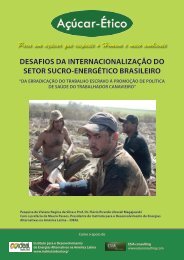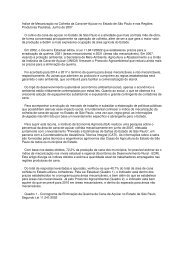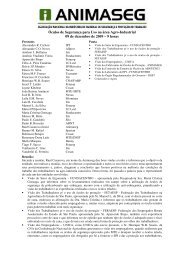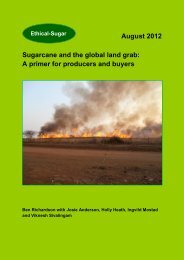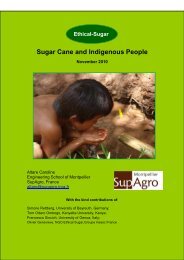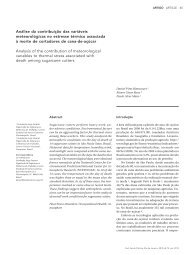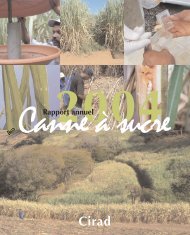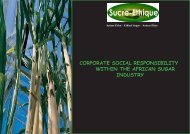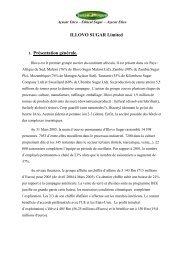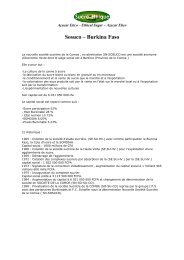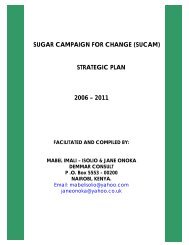April 2013 The Politics of Fairtrade Sugar in Belize ... - Sucre Ethique
April 2013 The Politics of Fairtrade Sugar in Belize ... - Sucre Ethique
April 2013 The Politics of Fairtrade Sugar in Belize ... - Sucre Ethique
You also want an ePaper? Increase the reach of your titles
YUMPU automatically turns print PDFs into web optimized ePapers that Google loves.
11<br />
beneficiaries – the farmers – <strong>in</strong> a difficult situation, particularly if the broader economic structures <strong>in</strong><br />
which they operate are not conducive to bottom-up growth.<br />
<strong>Fairtrade</strong> <strong>in</strong> Context: Br<strong>in</strong>g<strong>in</strong>g <strong>in</strong> the Bigger Picture<br />
<strong>The</strong>re are two important developments <strong>in</strong> the sugar supply-cha<strong>in</strong> to consider when assess<strong>in</strong>g the<br />
ability <strong>of</strong> <strong>Fairtrade</strong> to transform the livelihoods <strong>of</strong> cane farmers <strong>in</strong> <strong>Belize</strong>: the change <strong>in</strong> ownership <strong>of</strong><br />
the <strong>in</strong>dustry and its restructur<strong>in</strong>g <strong>in</strong> the wake <strong>of</strong> EU sugar reform. As noted <strong>in</strong> the <strong>in</strong>troduction, these<br />
two are related. When Tate & Lyle first announced its commitment to source <strong>Fairtrade</strong>, they stated<br />
that it would “help ensure a livelihood for farmers” by transferr<strong>in</strong>g millions <strong>of</strong> pounds worth <strong>of</strong> money<br />
from British consumers to <strong>Belize</strong>an farmers. Indeed, <strong>in</strong> its first year <strong>of</strong> operation the BSCFA received<br />
just under $4m worth <strong>of</strong> <strong>Fairtrade</strong> premiums. However, this must be seen aga<strong>in</strong>st the background <strong>of</strong><br />
chang<strong>in</strong>g terms <strong>of</strong> trade for the <strong>in</strong>dustry as a whole, which as a result <strong>of</strong> EU sugar reform, lost sales<br />
revenue worth over $10m <strong>in</strong> the first year alone (Richardson-Ngwenya and Richardson, forthcom<strong>in</strong>g).<br />
Indeed, Tate & Lyle itself acquiesced <strong>in</strong> this regulatory shift. In evidence taken by the UK government<br />
prior to reform, the company noted that while they wished to see “a remunerative price” be paid to<br />
<strong>Belize</strong> and other suppliers <strong>of</strong> raw sugar, their overrid<strong>in</strong>g concern was to ensure a ready supply <strong>of</strong><br />
cane and large marg<strong>in</strong>s for ref<strong>in</strong><strong>in</strong>g. In short, when push came to shove, the company prioritized its<br />
own narrow commercial <strong>in</strong>terests (Richardson-Ngwenya and Richardson, forthcom<strong>in</strong>g). In addition, it<br />
should be noted that the <strong>Fairtrade</strong> commitment extends only to Tate & Lyle’s retail sugar range, which<br />
is sold directly to consumers. Retail sugar accounts for around 20 per cent <strong>of</strong> its UK bus<strong>in</strong>ess; the<br />
rema<strong>in</strong>der is for <strong>in</strong>dustrial sugar, sold to food manufacturers for use <strong>in</strong> processed products and which<br />
is bought at lower prices from large-scale producers (i.e. through unfair-trade). In the case <strong>of</strong> sugar<br />
sourced from Cambodia, Tate & Lyle – and now American <strong>Sugar</strong> Ref<strong>in</strong><strong>in</strong>g – stand accused <strong>of</strong> trad<strong>in</strong>g<br />
<strong>in</strong> ‘blood sugar’ s<strong>in</strong>ce this was produced on land recently grabbed from peasants.<br />
American <strong>Sugar</strong> Ref<strong>in</strong><strong>in</strong>g has also been engaged <strong>in</strong> controversy <strong>in</strong> their takeover <strong>of</strong> <strong>Belize</strong> <strong>Sugar</strong><br />
Industries. After BSI borrowed heavily to <strong>in</strong>vest <strong>in</strong> a cogeneration energy project called BELCOGEN<br />
(which would generate electricity by burn<strong>in</strong>g cane residues), the <strong>Belize</strong>an government actively sought<br />
a buyer for the company to take on its $60m debts. After reject<strong>in</strong>g a demand from the BSCFA to<br />
takeover BSI, the government pushed through a parliamentary bill to provide ASR with major<br />
concessions, <strong>in</strong>clud<strong>in</strong>g a period <strong>of</strong> ten years relief from customs duties, excise duties and<br />
environmental taxes, and a 50 per cent reduction <strong>in</strong> stamp duty. As well as ask<strong>in</strong>g why the BSCFA<br />
were not <strong>of</strong>fered similar <strong>in</strong>centives, critics <strong>of</strong> this deal also noted that ASR may use these concessions<br />
to <strong>in</strong>vest <strong>in</strong> company-owned plantations <strong>in</strong> the country, which would slowly put cane farmers out <strong>of</strong><br />
bus<strong>in</strong>ess (<strong>Belize</strong>an, 2012). Clearly such a move would cause tensions with the mission <strong>of</strong> <strong>Fairtrade</strong><br />
to support the livelihoods <strong>of</strong> those same farmers.




